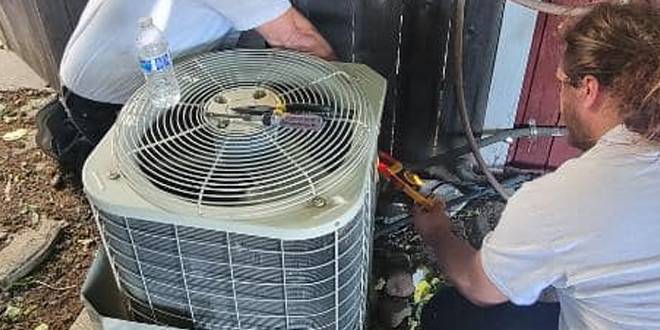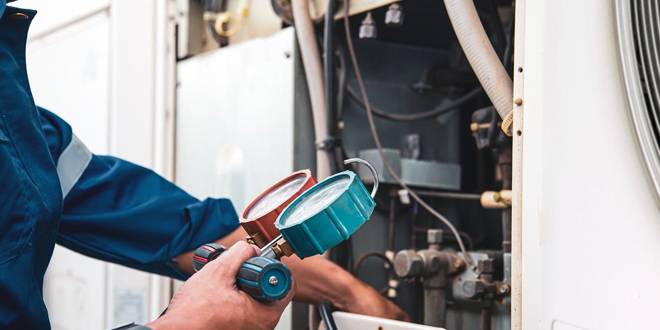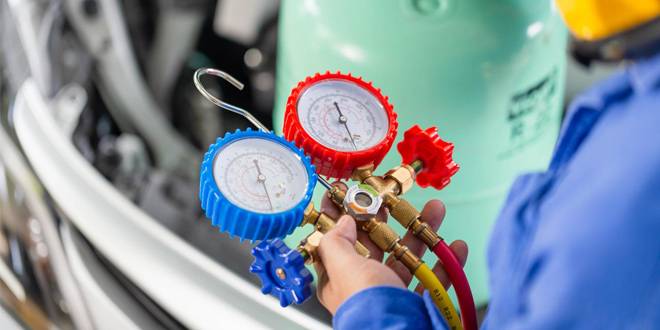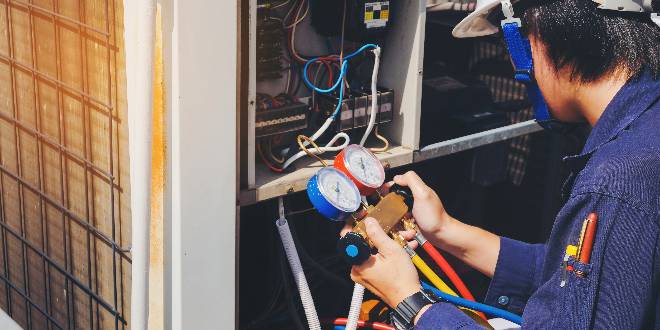
When it comes to maintaining a comfortable home, your air conditioner plays a crucial role, especially during the hot summer months. However, an often overlooked issue that can significantly impact your AC’s performance is a refrigerant leak. Understanding what causes refrigerant leaks, how to identify them, and what steps to take can save you time, money, and discomfort.
Key Points Covered
- Causes of AC refrigerant leaks
- Signs your AC might have a refrigerant leak
- The impact of leaks on system efficiency and costs
- Solutions for addressing refrigerant leaks
- Tips for preventing future leaks
- Benefits of professional maintenance
Glossary of Terms
- Refrigerant: A substance used in air conditioning systems to absorb heat and provide cooling.
- Evaporator Coil: The part of the AC system where the refrigerant absorbs heat from the air inside your home.
- Compressor: The component that circulates the refrigerant through the AC system.
- HVAC: Heating, Ventilation, and Air Conditioning, a system used to regulate indoor climate.
- Freon: A common type of refrigerant used in older air conditioning systems.
Common Causes of AC Refrigerant Leaks
Refrigerant leaks can occur for a variety of reasons. Here are some of the most common causes:
- Corrosion: Over time, the copper tubing in the evaporator coils can corrode, leading to small holes where refrigerant can escape.
- Vibrations: AC units generate vibrations during operation. These vibrations can cause joints or fittings to loosen, leading to leaks.
- Factory Defects: Occasionally, air conditioning units may have manufacturing defects that result in weak areas susceptible to leaks.
- Wear and Tear: Regular use over many years can cause wear on the components, increasing the risk of leaks.
Understanding the cause of the leak is crucial for effective repair and prevention.

Signs Your AC Might Have a Refrigerant Leak
Identifying a refrigerant leak early can prevent more serious issues down the line. Here are some common signs to watch for:
- Reduced Cooling Efficiency: If your AC isn’t cooling your home as effectively as it used to, it could be due to a refrigerant leak.
- Hissing or Bubbling Sounds: These noises can indicate a leak in the refrigerant lines.
- Increased Energy Bills: Leaks force your AC system to work harder, leading to higher electricity costs.
- Ice Buildup on Evaporator Coil: Low refrigerant levels can cause the evaporator coil to freeze, leading to ice buildup.
- Longer Cooling Cycles: If the AC takes longer than usual to cool your home, it might be low on refrigerant.
If you notice any of these signs, it’s essential to address the issue promptly to avoid further damage to your AC system. You can learn more about AC repair services here.
Impact of Refrigerant Leaks on Efficiency and Costs
Refrigerant leaks can significantly affect the efficiency of your AC system, leading to increased energy usage and higher utility bills. A system with a leak cannot effectively transfer heat, causing it to work overtime to maintain the desired temperature. This not only strains your AC unit but also shortens its lifespan. Additionally, the environmental impact of refrigerant leaks is a growing concern, as certain types of refrigerants contribute to ozone depletion.
Solutions for Addressing Refrigerant Leaks
Fixing a refrigerant leak requires professional expertise. Here’s what you can expect during the repair process:
- Inspection and Diagnosis: A certified technician will inspect your AC unit to pinpoint the leak’s location and assess the extent of the damage.
- Repair or Replace Components: Depending on the severity, parts of your AC system may need repair or replacement.
- Recharge Refrigerant: Once the leak is fixed, the technician will recharge your AC system with the correct amount of refrigerant.
- System Testing: After repairs, your AC system will be thoroughly tested to ensure it’s operating efficiently.
For expert AC repair services, visit our Vacaville AC Repair page.

Tips for Preventing Future Leaks
Prevention is always better than cure. Here are some tips to help you avoid future refrigerant leaks:
- Regular Maintenance: Schedule routine maintenance to keep your AC system in top condition. Our Vacaville AC Maintenance services can help.
- Use High-Quality Parts: Opt for high-quality components that are less prone to wear and tear.
- Keep the Area Clean: Ensure the surrounding area of the outdoor unit is free from debris and vegetation that might damage the coils.
- Seal Ductwork: Properly sealed ductwork prevents refrigerant from escaping.
Consider our Maintenance Agreement for regular check-ups and maintenance.
The Impact of Refrigerant Leaks on Energy Consumption
| Issue | Effect on Energy Consumption |
| Low Refrigerant Levels | Increases by up to 20% |
| Longer Cooling Cycles | Raises energy use significantly |
| Ice Formation on Coils | Causes inefficient cooling |
| Reduced Cooling Efficiency | Leads to overworked compressor |
Regular maintenance and timely repairs can mitigate these issues and optimize your system’s energy efficiency.
Fun Facts About AC Refrigerant Leaks
- ???? Environmental Impact: Certain refrigerants, such as Freon, are harmful to the ozone layer and have been phased out in new AC systems.
- ????️ Invisible Leaks: Some leaks are so small they go unnoticed until significant cooling loss occurs.
- ???? Freon-Free Future: Modern air conditioners use more environmentally friendly refrigerants, like R-410A.
FAQs About AC Refrigerant Leaks
1. How do I know if my AC is leaking refrigerant?
Watch for signs like reduced cooling efficiency, hissing sounds, and increased energy bills.
2. Can I fix a refrigerant leak myself?
It’s best to hire a professional to ensure safe and effective repairs.
3. How often should I check my AC for refrigerant leaks?
Annual maintenance can help detect leaks early and maintain system efficiency.
4. What happens if I ignore a refrigerant leak?
Ignoring a leak can lead to higher energy bills, reduced cooling, and potential system damage.
5. Is a refrigerant leak dangerous?
While not immediately harmful, prolonged exposure can affect indoor air quality. Learn more about maintaining indoor air quality.
6. Can a refrigerant leak be prevented?
Regular maintenance and inspections can help prevent leaks and extend your system’s life.
7. How much does it cost to fix a refrigerant leak?
Costs vary based on the leak’s severity and the required repairs. Financing options are available here.
8. Will a refrigerant leak cause my AC to stop working completely?
If left unaddressed, a significant leak can lead to system failure over time.

Keep Your Cool with All Weather Heating & Air Conditioning
Don’t let a refrigerant leak disrupt your comfort! At All Weather Heating & Air Conditioning, we specialize in diagnosing and repairing AC issues to keep your home cool and efficient. Our experienced technicians are ready to help you with everything from repairs to maintenance and installation.
If you suspect a refrigerant leak or need professional assistance, don’t hesitate to contact us today! We’re committed to providing top-notch service and ensuring your satisfaction.

